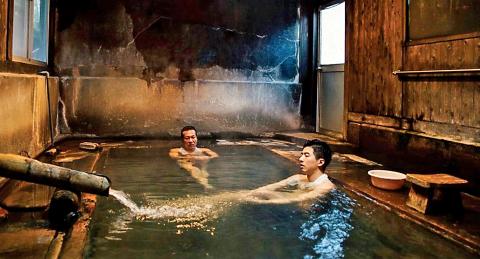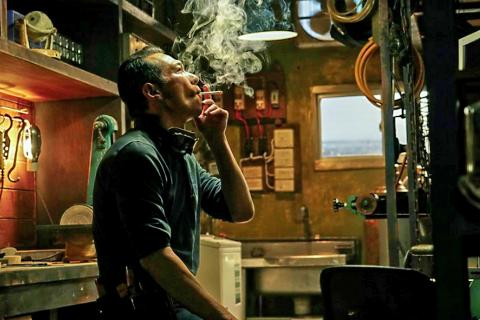Much is left unsaid in Father to Son, but as relationships between fathers and sons go, especially in Asian culture where affection is not always openly expressed, how much can be explicit?
The storylines and relations seem complicated in this poignant, subtle drama as it follows a 60-year-old, still rather dashing Fan Pao-te (Michael Huang, 黃仲崑), who falls ill at the beginning of the film and tries to come to terms with mortality and closure, especially with his father, who abandoned the family when he was young to seek his fortune in Japan.
Fan and his son (Fu Meng-po, 傅孟柏) are the focus of the main plot, but the film also spotlights many other characters while flashing back throughout Fan’s childhood and young adulthood. The parallels among fathers and sons, especially the relationships — or lack thereof — are apparent and it’s clear that history repeats itself in this small southern town. But fate can also be changed.

Photo courtesy of atmovies.com
The cinematography is stunning, and director Hsiao Ya-chuan (蕭雅全) chooses his backdrops well. Although the story is set mostly on one street in a sleepy, nondescript town, it fully makes use of the notion of being stuck in time with an old hotel, a traditional laundry shop with a sign emblazoned with black and gold calligraphy and a Japanese era-style hospital with terrazzo floors and long, narrow hallways. Even the hostess club that Fan and his buddy frequent, the roadside stall where they drink or Fan’s hardware store are shot in a way that creates an air of the fantastic even though it’s clear that this is reality.
Is this 2018 or 1987? Although the flashbacks are made clear in black and white, sometimes it is hard to tell until someone whips out the latest model smartphone — and then things become blurred again as people are seen smoking in offices and restaurants when Fan visits Japan. Maybe it doesn’t matter, as some things simply don’t change no matter what the era.
Through Fan’s father, the story also stretches back to post-war Taiwan, depicting a society that still retains some of its old Japanese connections, and where people would prefer to head overseas to make it big than stay at home as a nobody.

Photo courtesy of atmovies.com
This is Hsiao’s third feature film since 2010’s Taipei Exchange (36個故事), continuing his poetic style of never directly tackling the subject but instead telling the story through delicate sentiments and subtle relationships. Although the film seems all over the place at the beginning, as the plot progresses, nothing is superfluous as there’s a whole backstory spanning many decades that slowly ties things together.
Although Fan chose a simple life as a hardware store owner and amateur inventor, he’s highly intelligent and deeply philosophical, making for a complex character that’s intriguing from the very beginning as he heads out to fix a friend’s electrical problem with his tools around his belt as if he were a cop heading to solve a crime.
His counterpart is his buddy A-kao (Long Shao-hua, 龍劭華), the carefree owner of a fruit store, who, although is not a major part of the film, does a brilliant job in providing chuckles and dragging Fan into his shenanigans. His elated expression when Fan, who had abstained from drinking since he fell ill, finally took a sip of beer, is priceless.
Fu also delivers a good performance as the son, and even though father and son do not seem to exchange many words, their affection and love for each other are clearly felt.
Hsiao is indeed deserving of best director at this year’s Taipei Film Awards, where the film also picked up best original score (Summer Lei, 雷光夏 and Chris Hou, 侯志堅) and best art direction. It’s a movie that’s meant to be felt and pondered upon, leaving the audience for much reflection long after the curtain draws.

The People’s Republic of China (PRC) last week offered us a glimpse of the violence it plans against Taiwan, with two days of blockade drills conducted around the nation and live-fire exercises not far away in the East China Sea. The PRC said it had practiced hitting “simulated targets of key ports and energy facilities.” Taiwan confirmed on Thursday that PRC Coast Guard ships were directed by the its Eastern Theater Command, meaning that they are assumed to be military assets in a confrontation. Because of this, the number of assets available to the PRC navy is far, far bigger

The 1990s were a turbulent time for the Chinese Nationalist Party’s (KMT) patronage factions. For a look at how they formed, check out the March 2 “Deep Dives.” In the boom years of the 1980s and 1990s the factions amassed fortunes from corruption, access to the levers of local government and prime access to property. They also moved into industries like construction and the gravel business, devastating river ecosystems while the governments they controlled looked the other way. By this period, the factions had largely carved out geographical feifdoms in the local jurisdictions the national KMT restrained them to. For example,

The remains of this Japanese-era trail designed to protect the camphor industry make for a scenic day-hike, a fascinating overnight hike or a challenging multi-day adventure Maolin District (茂林) in Kaohsiung is well known for beautiful roadside scenery, waterfalls, the annual butterfly migration and indigenous culture. A lesser known but worthwhile destination here lies along the very top of the valley: the Liugui Security Path (六龜警備道). This relic of the Japanese era once isolated the Maolin valley from the outside world but now serves to draw tourists in. The path originally ran for about 50km, but not all of this trail is still easily walkable. The nicest section for a simple day hike is the heavily trafficked southern section above Maolin and Wanshan (萬山) villages. Remains of

Shunxian Temple (順賢宮) is luxurious. Massive, exquisitely ornamented, in pristine condition and yet varnished by the passing of time. General manager Huang Wen-jeng (黃文正) points to a ceiling in a little anteroom: a splendid painting of a tiger stares at us from above. Wherever you walk, his eyes seem riveted on you. “When you pray or when you tribute money, he is still there, looking at you,” he says. But the tiger isn’t threatening — indeed, it’s there to protect locals. Not that they may need it because Neimen District (內門) in Kaohsiung has a martial tradition dating back centuries. On